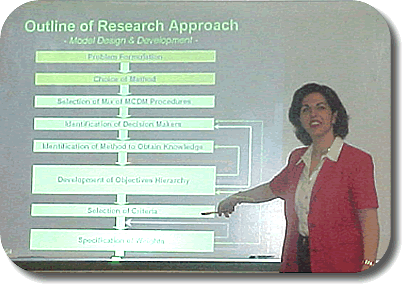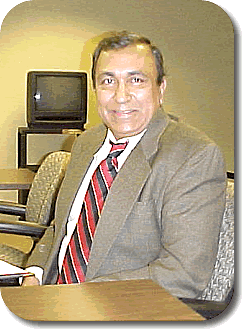On November 20, 2003, doctoral candidate Ubaid U. Malik defended his dissertation research proposal on the establishment of a sustainable solid waste management program for developing countries n South Asia.
The objective of Ubaid’s research is to develop a waste management program suitable for developing economies in South Asia, using as a model advanced programs such as those implemented in the United States for liner, final cover, leachate, landfill gas, surface water, groundwater and disposal material monitoring while taking into consideration the limitations and difficulties developing economies share. The system to be developed will be verified and validated by applying it to the country of Pakistan. The research will focus on the establishment of an efficient solid waste management program for Pakistan. It will examine existing solid waste practices, assess problems associated with handling of solid waste in Pakistan, and will recommend a model for the country based on state-of-the-art information about the application of appropriate technology to solid waste management challenges in developing economies.
In Pakistan, municipal corporations and municipal councils in Pakistan are responsible for the provision of basic essential services to the citizens, which include solid waste management, water supply, drainage, wastewater treatment and disposal, besides preventive health. The current situation in Pakistan is very critical in all cities due partially to a lack of in-house capacity and technical know-how for the provision of these services efficiently and effectively.
In Pakistan, as in any other country, chemical hazards could cause pollution of water and food sources, damage to the environment and risks to public health that could result in disasters such as fire, explosions, and other calamities. It is clear that public health and the environment could be affected drastically as a result of mishandling and mismanaging solid waste.
As part of the initiation of this research, Ubaid spent five weeks traveling in Pakistan in November and December 2003, during which time he interviewed leading specialists throughout the country.
Serving on Ubaid’s Research Committee are EMSE professors E. L. Murphree (Chairman), Shahram Sarkani, and Jonathan Deason, as well as Dr. Sohail Zafar from the World Bank.
![]()

On April 19, 2004, doctoral candidate Elvin Yuzugullu defended the research proposal for her dissertation on the design and evaluation of a multiobjective model for selecting between hydrogen production options in the energy sector. The main focus of the research will be to test the resilience of decision making among a diverse set of decision makers. The main steps will involve:![]() Development of an appropriate decision model;
Development of an appropriate decision model;![]() Elicitation of weights from a diverse set of stakeholders;
Elicitation of weights from a diverse set of stakeholders;![]() Measuring the resilience of the model to the range of differing weights; and
Measuring the resilience of the model to the range of differing weights; and![]() Evaluation of the model by comparing it to the decision making baseline.
Evaluation of the model by comparing it to the decision making baseline.
Hydrogen is abundant in nature, but requires another source of energy to separate it into free form. Once separated, it can be utilized in every aspect of today's energy system, from fueling cars and providing residential electricity to heating applications and even powering small appliances. However, since hydrogen needs to be produced from other sources, complexities arise. Hydrogen can be produced from a variety of sources, either fossil-based or renewable. Each individual production pathway involves different considerations and impacts. When a range of stakeholders with differing views are to decide on a production method, the issues become even more complex. Therefore, Elvin's research aims to develop a structured approach to making decisions and to test how robust the decision making process is among divergent decision makers.
Elvin's research committee consists of Dr. Jonathan Deason (advisor), Dr. Tom Mazzuchi, Dr. Michael Duffey, and Dr. Jack Harrald.


